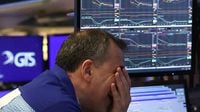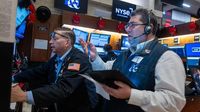U.S. stocks took a severe nosedive this week, entering correction territory as escalating trade tensions between the United States and China led to massive losses across major indexes. On April 4, 2025, the Dow Jones Industrial Average plunged 2,231.07 points, or 5.5%, closing at 38,314.86. This marked its largest single-day decline since June 2020, driven by fears of a full-blown trade war following President Trump’s announcement of sweeping tariffs on imports.
China retaliated swiftly, imposing a staggering 34% tariff on all U.S. goods effective April 10, 2025, matching Trump's tariffs on Chinese imports. This retaliatory move has stoked fears of a global recession, with JP Morgan projecting a 60% chance of such an outcome in the U.S. this year. The S&P 500 also saw significant losses, falling 322.44 points, or 5.97%, to close at 5,074.08, its lowest finish in 11 months. The Nasdaq Composite, hit particularly hard, dropped 962.82 points, or 5.82%, confirming its entry into bear market territory.
Thursday, April 3, had already set the stage for turmoil, as the three major U.S. indexes experienced their sharpest daily declines since the pandemic began. The Dow fell 1,680 points, or 4%, while the S&P 500 and Nasdaq dropped 5% and 6%, respectively. Collectively, these declines wiped out more than $4.9 trillion in market capitalization among S&P-listed companies, with tech giants like Apple, Nvidia, and Tesla leading the charge in losses.
Investors reacted negatively not only to the tariffs but also to Trump's steadfastness in his trade policies, as he stated emphatically on social media, "POLICIES WILL NEVER CHANGE." This sentiment was echoed by various analysts who noted that the market is currently experiencing a significant shift in investor confidence. The CBOE Volatility Index, often referred to as Wall Street's fear gauge, spiked to its highest level since October 2020, reflecting the heightened anxiety among traders.
Federal Reserve Chairman Jerome Powell addressed the market's concerns, suggesting that the tariffs could lead to higher inflation and slower economic growth. In a speech on April 4, he mentioned that it was "too soon" to determine the next steps for monetary policy, indicating a cautious approach in the face of rising uncertainty. Powell's remarks came as Trump called for immediate interest rate cuts, a request that Powell did not endorse, emphasizing the need for careful consideration of the economic landscape.
In the midst of this turmoil, the labor market showed some resilience. The Bureau of Labor Statistics reported that the U.S. added 228,000 jobs in March, significantly surpassing economists' expectations of 140,000. However, the unemployment rate inched up to 4.2%, the highest level since November 2021, raising concerns about the sustainability of job growth amid shifting economic conditions.
The stock market's decline has also affected oil prices, which fell to their lowest levels since 2021 as fears of a recession dampened demand forecasts. Brent crude prices dropped 7% to $65 per barrel on April 4, highlighting the broader impact of trade tensions on global markets.
As the week unfolded, companies heavily reliant on Chinese production faced severe stock price declines. Apple, for instance, saw its shares fall by 7.29%, with China accounting for about 80% of its production capacity. Other major corporations, including Starbucks and Tesla, experienced similar downturns, with each losing at least 7% of their market value.
The repercussions of the trade war extend beyond U.S. borders. Global markets reacted sharply, with many countries considering their own retaliatory measures against U.S. tariffs. The prime ministers of Britain, Australia, and Italy held discussions on how to respond to the escalating situation, underscoring the international ramifications of Trump's policies.
Amid the chaos, some analysts expressed hope that the situation could stabilize. Mark Dowding, chief investment officer at RBC Global Asset Management, suggested that if the government were to announce trade deals that could reverse most tariffs quickly, the outlook for continued economic expansion in 2025 could improve. However, he also noted that the long-term effects of the tariffs remain uncertain.
In the cryptocurrency space, Bitcoin experienced a tumultuous first quarter but managed to recover slightly, gaining 0.92% to reach $83,915.98 on April 4. The digital currency's performance reflects the broader volatility in the financial markets as investors seek refuge in various asset classes amid uncertainty.
As the week concluded, the market remained on edge, with futures for the Dow Jones, S&P 500, and Nasdaq set to open on April 6, 2025. Investors are bracing for further volatility as they navigate the implications of Trump's tariffs and China's retaliatory measures. The coming days will be crucial in determining the trajectory of the markets as global economic conditions continue to evolve.







